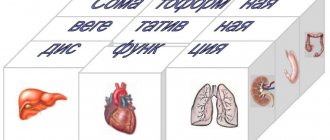Our clinic treats nervous disorders and psychosomatic diseases, incl. nervous exhaustion, astheno-neurotic syndrome and its consequences in the cardiovascular, endocrine, immune, and digestive systems. We successfully treat stress-related pain syndromes of the head, face, muscles, spine, joints, and psychogenic abdominal pain.
- Causes of exhaustion
- What exactly suffers from exhaustion?
- Symptoms of nervous and general exhaustion of the body
- What to do
- How to contact the clinic
Causes of nervous system exhaustion
Each person’s body has its own “emergency resource”: a supply of nutrients, hormones, immune factors, microelements. This untouchable resource can only be used in response to some kind of super strong stimulus (stress). The irritant can be a lack of sleep and rest, mental stress, strong emotion, injury, surgery, etc.
Normally, a stress reaction helps a person to mobilize and overcome the problem. But if the body has already used up its emergency resource, and the stimulus continues to act, nervous exhaustion sets in, and then general exhaustion of the body. And in this case, help is needed. And not stimulation with potent medications (there is nothing to stimulate - there are no resources), but help, calm, systematic treatment. We have accumulated extensive experience in the treatment of nervous and general exhaustion, astheno-neurotic syndrome.
Diagnostics
To clarify the cause of exhaustion, a consultation with a therapist is usually required, who is responsible for the initial examination and excludes the most typical factors that cause weight loss. A comprehensive study of the condition of internal organs and assessment of neurological and mental reactions is necessary. The following methods have the greatest diagnostic value:
- Sonography
. First, an ultrasound of the abdominal cavity is performed, during which signs of inflammatory and degenerative processes, the presence of stenoses and space-occupying formations are revealed. The motility of the stomach and intestines is assessed. An ultrasound of the thyroid gland and adrenal glands is performed; in women, the mammary glands are examined to exclude cancer. - X-ray method
. In case of exhaustion, the condition of the gastrointestinal tract must be checked, for which a series of X-rays with contrast are performed. The method is effective for stenosis and tumors of the esophagus and allows one to evaluate the rate of chyme movement. To exclude damage to the pituitary gland, a targeted radiograph of the sella turcica is recommended. - Endoscopic studies
. Endoscopy helps to study in detail neoplasms and strictures in the upper part of the digestive canal, which often cause depletion of the body. During the procedure, a methylene blue test is performed to detect metaplasia, as well as an endoscopic biopsy of suspicious formations to exclude an oncological cause of cachexia. - Blood tests
. The degree of depletion of the body is judged by the level of decrease in protein levels in a biochemical blood test. Determining the concentration of nitrogen metabolism products and basic electrolytes makes it possible to assess the severity of damage to internal organs. The level of tropic hormones of the pituitary gland, liberins and statins of the hypothalamus is measured. - Neurological examination
. The examination is indicated if there are signs of nervous and physical exhaustion. They examine the level of consciousness and cognitive capabilities, check muscle tone and coordination of movements. To exclude severe lesions that are accompanied by refusal to eat, CT and MRI of the brain are prescribed. The functional activity of brain cells is recorded on an EEG.
If the symptoms of exhaustion of the body are accompanied by “minor signs” of oncological pathology (fatigue, lethargy, general malaise, anemia), it is necessary to examine the blood for tumor markers, carry out additional instrumental procedures - CT scan of the abdominal cavity and chest, scintigraphy of the body. All patients undergo a screening test for HIV infection. When exhaustion is combined with a dysmorphomanic state, consultation with a psychiatrist is required to exclude a neurotic or psychotic cause of the disorder.
What exactly suffers when the body is exhausted?
The body is depleting the resources it uses to protect itself from danger:
- Exhaustion of the nervous system, astheno-neurotic syndrome. When an emotion associated with anxiety and danger appears, the nervous system sends stimulating signals to the endocrine glands, heart and blood vessels, and immunity (the body must be ready to physically respond to danger, even if you do not plan it). At the same time, control over those processes that can wait for a calmer period is reduced, primarily digestion and the work of the gonads. With a long stay in a state of stress, asthenic-neurotic syndrome develops.
- Disorganization of the endocrine glands. Tired of constant stimulation by stress, the glands release hormones less smoothly. Hence problems with the thyroid gland, weight loss or gain, sexual disorders, ovarian dysfunction, diabetes, etc. with astheno-neurotic syndrome.
- Disturbances in the functioning of the heart and blood vessels. Slow or rapid heartbeat, arrhythmia, decrease and increase in blood pressure in response to constant stimulation of blood vessels by stress hormones are natural consequences of exhaustion of the body, astheno-neurotic syndrome.
- Depletion of immunity. Previously relatively harmless microbes can take advantage of a weak immune system and cause quite unpleasant phenomena. These are herpes, thrush, dysbacteriosis, tonsillitis, cervical erosion, etc. Rheumatic processes with pain in muscles, joints and spine are possible.
- Disorders of the digestive tract. Dysbacteriosis, irritable bowel syndrome and peptic ulcer are constant companions of astheno-neurotic syndrome.
Treatment
Help before diagnosis
The appearance of symptoms of exhaustion is usually caused by serious causes that cannot be eliminated through self-treatment. In most cases, emergency medical care is required to prevent critical, irreversible changes to internal organs. If symptoms occur against the background of anorexia nervosa, and the patient does not consider himself sick, relatives and close friends can arrange a consultation with a specialist or take the person to a specialized clinic.
Malnourished patients require nutritional supplementation
Conservative therapy
The main goal of treatment is to meet nutritional needs. In mild cases of depletion of the body, the caloric content of the diet is gradually increased; the diet should contain a large amount of protein, complex carbohydrates and vitamins. In severe situations, tube feeding or parenteral administration of special solutions of amino acids and fat emulsions is indicated. Anorexia requires individual and group psychotherapy. For etiotropic treatment of conditions causing exhaustion, the drug treatment regimen includes:
- Enzymes
. To improve digestion processes in chronic enteritis and pancreatitis, enzyme agents are prescribed that replace the function of the pancreas. Taking probiotics helps normalize microflora and prevent the development of SIBO. - Antibacterial agents
. Therapy is carried out for chronic infections that cause intoxication and catabolic reactions. Drugs are selected based on the properties of the pathogen. Antibiotics and antiprotozoal medications are recommended for the treatment of opportunistic infections in AIDS. - Hormonal drugs
. If symptoms of exhaustion are caused by endocrine pathology, replacement therapy is used. Most often, glucocorticoids, levothyroxine and sex hormones are prescribed; for panhypopituitarism, pituitary tropic hormones are sometimes used. - Cardiotropic drugs
. Cardiac glycosides, antianginal drugs (calcium channel inhibitors, beta blockers) fully or partially compensate for heart failure. Thiazide and potassium-sparing diuretics are effective in eliminating edema. - Cytostatics
. The drugs are indicated both for severe connective tissue diseases, amyloidosis, and for the treatment of the tumor cause of cachexia. Medicines and doses are selected individually, taking into account the localization of the pathological process and the presence of metastases.
Surgery
When a malignant neoplasm is identified as the cause of exhaustion, radical interventions are necessary to remove the neoplasia along with the affected tissue and lymph nodes. For stage 1-2 cancer, organ-conserving surgery is the method of choice. In advanced cases, advanced techniques are used. To treat exhaustion of the body, which is caused by obstruction of the esophagus, stenting of the narrowed area is performed. If necessary, esophagoplasty is performed with gastric or intestinal grafts.
Symptoms of nervous and general exhaustion of the body
- Feeling tired (up to chronic fatigue syndrome);
- Shallow and/or intermittent sleep, possible severe daytime sleepiness;
- The predominance of anxious thoughts over positive ones, weak perception of pleasant sensations;
- Palpitations, unstable blood pressure;
- Sensitivity to irritants (sharp sounds and lights, unpleasant conversation, strong smell, etc.);
- Headache
- Pain in the neck, back, limbs, muscles (fibromyalgia);
- There may be a slight increase in temperature for no reason;
- Discomfort in the abdomen;
- Exacerbation of tonsillitis, pharyngitis, gastritis and other inflammatory diseases of the mucous membranes
Symptoms
The main symptom of cachexia is progressive weight loss. Other symptoms: weakness, dehydration, swelling, lack of subcutaneous fat, dystrophic changes in hair and nails, constipation, cessation of menstruation, anemia (anemia), decreased mobility (up to complete immobility), loss of consciousness.
The development of cachexia can be indicated by a decrease in body mass index (BMI) of less than 18.5 units. This index is easily calculated using the formula BMI = weight (kg) / height ² (m). A normal BMI is from 18.5 to 25.
What to do if the nervous system is exhausted
The first thing we will do in case of astheno-neurotic syndrome is to relieve anxiety and establish normal healthy sleep, which brings a feeling of rest (stop further withdrawal of the body’s resources). In a few days you will feel calmer and freer.
Next, everything will be built like this:
- Let’s perform a small examination and find out what exactly “broke” in the body during the period of exhaustion;
- We will provide the necessary help exactly where it is needed;
- Let's give it time to recover;
- We will check the results of treatment (the control examination will be smaller in scope - we only check what was outside the normal range);
- We will gradually stop treatment as we regain good health and resources.
Some people easily cope with stress from birth, others can be taught this. We may offer you a course of correctional work with a clinical psychologist or psychotherapist. The task is to learn to turn off nervous tension when it is useless. This will prevent the development of astheno-neurotic syndrome in the future.
Fatigue of decisions, or Why “the head doesn’t think well”
Exhaustion attacks more than just our ability to self-control. It extends to many forms of self-regulation. Most of all, it influences decision making. The more decisions we have to make—from buying a new car to scheduling conference attendees—the more difficult it is for us to continue to act in the same spirit.
Researchers call it “decision fatigue,” a condition that causes us to do one of two things:
- make frivolous choices;
- To do nothing.
What to choose? The question is complex
Due to decision fatigue on Wednesday, we return the ridiculous purchases we made on Tuesday, because the next day, when the fatigue passes, our heads are clearer. This is why we put off making decisions when we are too tired to do it now.
But exhaustion affects more than just decisions. Interpersonal relationships and the ability to change are under attack. If purchases, decisions, and resistance to temptation are depleted, then complex behaviors are also subject to depletion (scientists confirm this).






